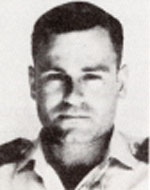Shani, Uri
Uri, son of Miriam and Zalman, member of Ein Harod, was born on August 5, 1940 in Ein Harod (Meuhad) and attended elementary school and high school in the kibbutz. From an early age Uri excelled in his love of nature and landscape. With his friends he traveled extensively and toured the country and photographed with his camera a landscape he loved. He and his friends also organized youth activities on the kibbutz, trips and sports operations. When he was a student, Uri was always responsible for the animal corner. On Saturdays he went out with his friends to look for reeds of birds and birds in the Gilboa Mountains. In the kibbutz he established cages for the animals and devoted themselves to their cultivation and cultivation. He was by nature a vigorous young man, entrepreneurial and resourceful, quick and full of original ideas. He was strong and physically fit, and one of his teachers described him as a solid figure, a mixture of seriousness, responsibility, dedication and courage. Together with his friends, he went to a national instructors’ course for the kibbutz and later became a young class leader. To his apprentices he took responsibility and paternity. From a young age, he saw his future as a kibbutz member, but he was always interested in aviation. Uri was drafted into the IDF in mid-August 1958 and volunteered for a pilot’s course, and was able to finish his long and difficult flight course, and his friends in the kibbutz thought that he would not cope with the burden of studies. His friends succeeded well and became a pilot in the Israel Air Force, and Uri was very attached to the agriculture. Every vacation was devoted to his wife, children and Ein Harod. He had never missed an opportunity to spend even a few hours in the family. His instructors and fellow pilots testified that on the ground Uri was quiet, modest and withdrawn, but the air was a brave fighter pilot and a fearless fighter. Uri was among the first Phantom pilots in the Air Force. For three years he taught at the flight school and was sent to Uganda to help establish an air force there and train Ugandan pilots. During his time in Africa, Uri had a lot to do with his old hobby – hiking in nature and watching the landscape. At every free moment he went with his friends on trips to the jungles, to the snowy Mount Kilimanjaro, to the lakes and various sites. He described his many impressions of Africa from the letters home, which were full of Yaffa and colorful descriptions. Uri participated as a fighter pilot in the Six-Day War and in the War of Attrition. He was among the first pilots to embark on combat missions deep inside Egypt. After one of these flights, Uri, who was then presented as a pilot, described how he noticed the flight into Egypt. “The farmers grove in plows tied to a pair of cows or oxen. They glanced at us and waved goodbye. In the 1973 Yom Kippur War, Uri was a fighter pilot and during the first three days of the war he managed to embark on a number of sorties in Egyptian territory and to attack targets there, despite the fact that he did not know how to do so. The heavy fire and the missiles fired by the Egyptians at his plane, on October 8, 1973. His plane was hit and he was killed when he attacked a bridge on the Suez Canal and was laid to rest in the military section of the Ein Harod cemetery. Children, parents and two brothers In a letter of condolence to the bereaved family, Defense Minister Moshe Dayan, That Uri was an excellent soldier, an excellent officer and a model member.That was about the character of Air Force pilot Major Uri Shani, published in the booklet “Eleven Boys”, published in Kibbutz Ein Harod in memory of the farm’s sons who fell in the war.
